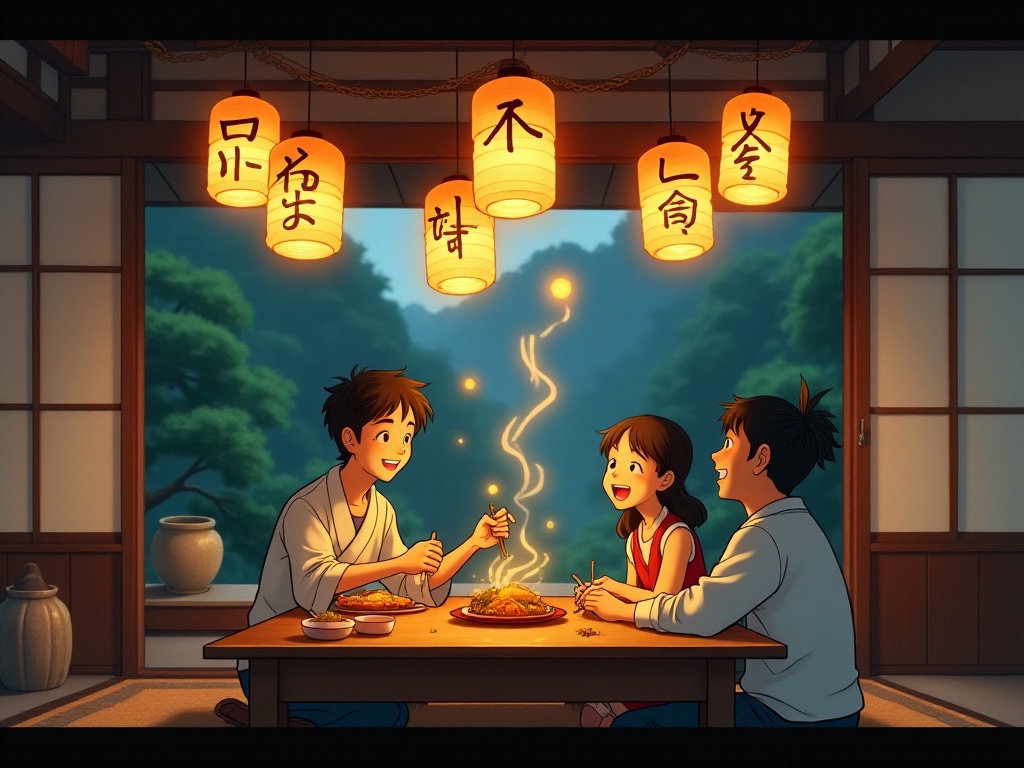Beginning
In early 2024, I had the fortune of living with an elderly person who lived alone in Tokyo for three months. To be honest, I didn't initially expect this would be such a special experience. At first, I was simply looking for an environment to practice Japanese, but looking back now, what this period brought me was far more than just language improvement.
I had actually visited Japan several times before for tourism, but these were always fleeting visits, staying in places like Tokyo and Osaka for just three to five days at most. After each return, I felt there was more to see, always feeling I hadn't truly understood the essence of Japanese culture. This time I was determined to do a long-term stay, wanting to truly experience the daily life of Japanese people.
Choosing to live with an elderly person living alone was an unexpected decision. While browsing accommodation information, I saw this option and found it intriguing. Honestly, I had worried about potential generation gaps and cultural differences leading to conflicts. But now looking back, these concerns were completely unnecessary.
First Arrival in Tokyo
I remember that evening when I dragged my suitcase, following the navigation step by step to find Grandma Tanaka's house. In Tokyo's February, the weather had started to slowly warm up, with a faint scent of plum blossoms in the air. Grandma Tanaka's house was in a quiet residential area in Tokyo's suburbs, surrounded by typical Japanese detached houses with various plants growing in their gardens.
When I stood in front of Grandma Tanaka's house, I was honestly quite nervous. After all, living with a stranger, an elderly person, for three whole months was a completely new challenge for me. But when I saw 81-year-old Grandma Tanaka standing at the entrance to welcome me, all my nervousness instantly disappeared.
She wore a dark blue kimono, and though slightly stooped, she was mentally sharp. Her face was full of wrinkles, but when she smiled, those wrinkles were like blooming flower petals, warm and welcoming. What impressed me most were her eyes; though aged, they still sparkled with wisdom.
"Welcome to Tokyo, this is your home now," Grandma Tanaka said to me in slow and clear Japanese. She deliberately slowed her speech to ensure I could understand every word. At that moment, I suddenly understood why many people say that to truly master a language, textbooks alone are far from enough. Language is not just a combination of vocabulary and grammar, but also a transmission of emotions.
Grandma Tanaka's home was a typical Japanese residence, though not large, it was kept very neat. Several pairs of slippers were arranged neatly at the entrance, the living room was covered with tatami mats, and calligraphy works hung on the walls. She showed me to my room, a south-facing Japanese-style room that, though sparsely furnished, had everything necessary: a wardrobe, a desk, a small tea table, and a traditional futon.

Daily Life
Living with Grandma Tanaka, every day was a vivid language lesson. At 6:30 in the morning, I was often awakened by birds chirping in the yard. Grandma Tanaka always woke up earlier than me, and by the time I walked into the kitchen, she was already preparing breakfast.
Japanese breakfast preparation involves many steps, but Grandma Tanaka always enjoyed it thoroughly. She taught me how to cook perfect white rice, told me how to control the heat when steaming egg custard, and taught me how to select the freshest fish slices. She would explain in detail the characteristics and cooking methods of each ingredient, which became the most practical vocabulary learning.
Did you know? In Japanese, there are several ways just to say "cook." Cooking rice is "炊く", cooking soup is "煮る", and cooking noodles is "茹でる". These subtle differences might never have stuck in my mind if not for practical daily life. Through daily practice, these words naturally became part of my vocabulary.
Grandma Tanaka paid particular attention to nutritional balance in meals. She told me that Japanese longevity is inseparable from their dietary habits. Every breakfast would include rice, miso soup, grilled fish, natto, pickled vegetables, and various side dishes. She taught me to recognize different types of miso - some sweet, some salty, some smooth, some grainy. Each type of miso has its specific uses and pairings.
Beyond cooking, daily housework was also a good opportunity for language learning. Sweeping, mopping, hanging clothes, watering plants - each action has its specific expression. Grandma Tanaka would teach me relevant vocabulary and sentence patterns while doing these tasks. Gradually, I found myself able to fluently describe these daily activities in Japanese.
Every evening, we would watch some TV together. This was an excellent opportunity to improve listening skills. Japanese TV programs are diverse, including news, food shows, and variety shows. Grandma Tanaka would patiently explain parts I didn't understand, and sometimes we would discuss the content. Through such exchanges, I not only improved my language ability but also learned about many Japanese current events and culture.
On weekends, Grandma Tanaka would sometimes take me grocery shopping at nearby supermarkets. In the supermarket, I learned to recognize the names of various ingredients and understood Japanese price levels. Sometimes we would also walk in nearby parks, watching children play and listening to elderly people chat - these were the most natural language environments.

Cultural Encounters
In my interactions with Grandma Tanaka, I often encountered small incidents brought about by cultural differences. I remember once when I stuck my chopsticks directly into my rice, Grandma Tanaka immediately stopped me. It turns out in Japan, this action called "箸建て" is done when making offerings to the deceased. Such cultural taboos are often glossed over in language textbooks but are particularly important in real life.
Another time, I tried to pick up food for Grandma Tanaka with my chopsticks, but she politely declined. She explained that in Japan, using your own chopsticks to pick up food for others is impolite, known as "箸渡し", which is also related to funeral customs. If you want to serve food to others, you should use serving chopsticks.
These detailed cultural differences made me realize that language learning is not just about mastering the language itself, but more importantly, understanding the cultural connotations behind the language. Grandma Tanaka was always patient in explaining the origins of these customs, which gave me a deeper understanding of Japanese culture.
At Grandma Tanaka's house, I also learned many Japanese etiquette customs. For example, saying "excuse me" (お邪魔します) when entering, "I'm leaving" (いってきます) when going out, and "I'm home" (ただいま) when returning. These seemingly simple greetings actually contain Japanese people's deep understanding of the concept of "home."

Emotional Exchange
What touched me most was Grandma Tanaka's tolerance and understanding. At first, my Japanese was very poor, and I often made mistakes or couldn't express myself clearly. But she never showed impatience, always smiling and waiting for me to finish speaking, then gently correcting my mistakes.
Sometimes when I felt frustrated due to language barriers, Grandma Tanaka would share her experiences of learning English when she was young. She said learning a new language is like climbing a mountain - though the process is difficult, if you persist, you'll always see different scenery. Such encouragement reduced much of my pressure in learning Japanese.
I remember one evening when we looked through her photo album from when she was young. In the photos, she wore bright kimonos, standing under cherry blossom trees, young and beautiful. Those yellowed photos recorded Japan's entire process from post-war to economic takeoff. Grandma Tanaka told me about the era of material scarcity she had experienced, and how Tokyo developed step by step into the international metropolis it is today.
Through these conversations, I not only learned many historical vocabulary words but more importantly understood the life trajectory of an ordinary Japanese person. Grandma Tanaka's stories made me realize that every elderly person is a living history book, and their experiences and wisdom deserve our careful listening.

Unexpected Gains
This homestay experience brought me far more than just language improvement. Through my interaction with Grandma Tanaka, I gained a deep understanding of elderly life in Japan. In a metropolis like Tokyo, there are actually over 500,000 elderly people living alone. This number shocked me and made me start thinking about various issues facing an aging society.
Grandma Tanaka told me that her three children all work and live in other cities. Although they often keep in touch through video calls, they can't be together day and night. This situation is very common in Japan and is one of the reasons why Japan launched the "homestay student" program.
But what surprised me was that living alone hasn't made these elderly people lose their enthusiasm for life. Grandma Tanaka participates in various community activities every week, such as flower arrangement classes and calligraphy classes. She also often tends to the community garden with neighbors and participates in book clubs. These activities not only enrich her life but also keep her thirst for knowledge strong.
I noticed that Grandma Tanaka's phone was loaded with many useful apps - she uses LINE to contact friends and family, food apps to look up recipes, and even video software to watch online courses. This completely overturned my stereotypes about elderly people. She said learning as long as you live is her secret to staying young.

Insights
This experience made me understand that the best way to learn a language is to completely immerse yourself in the target language environment. But more importantly, you need to approach different lifestyles with an open and humble attitude.
During the three months living with Grandma Tanaka, my Japanese level improved by nearly two grades. But compared to language improvement, I gained more in terms of reflection on life. When we overcome language barriers and communicate sincerely with others, surface differences like age and nationality become less important.
Everyone has their own story that deserves to be heard and understood. Grandma Tanaka taught me not just Japanese, but how to view the world with a more inclusive attitude. Through her experiences, she showed me that age is not a barrier, and curiosity and learning ability don't diminish with age.
I began to understand why Japanese elderly people can maintain such a positive attitude toward life. This is not only related to their lifestyle habits but more to their spirit of continuous learning and keeping up with the times. This spirit is worth learning from.
Conclusion
If you're also learning a foreign language, I sincerely recommend trying this kind of in-depth travel experience. Living with locals, integrating into their lives, and listening carefully to every story. Such a journey not only helps you master a language but also gives you an unforgettable life experience.
Language learning shouldn't be limited to classrooms and textbooks; it should be a cultural immersion, a dialogue of hearts. Through communication with people of different cultural backgrounds and age groups, we can gain broader perspectives and more life wisdom.
Finally, I want to especially thank Grandma Tanaka. She was not just my language teacher but also a wise elder in my life. It is such cross-cultural exchanges that make travel more meaningful and language learning full of warmth. This experience taught me that true language learning should be a dialogue between hearts, a meeting of lives.


